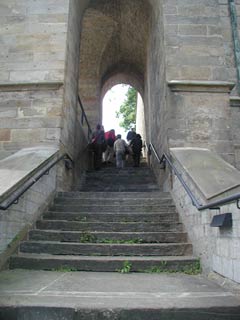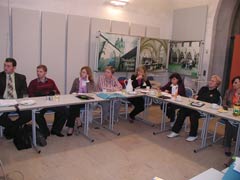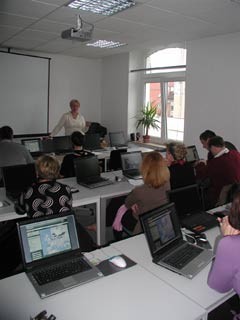
From 1st till 4th of July 2010 the European Centre for Culture and Information in Thuringia invited Polish and Ukrainian partners to
take part in the workshop „VIA REGIA – Major Cultural Route of the Council of Europe“. The aim has been the further development of
the existing working contacts to the participants to a membership in the network „VIA REGIA – Major Cultural Route of the Council
of Europe“. The network is the only Cultural Routes project with active Ukrainian partners that has been acknowledged by the Council of Europe.
During the event that has taken place in the historical buildings of the Cathedral St. Mary in Erfurt the following concrete common
projects has been prepared for 2010 and the following years:
![]() The European long-distance highway 40 (E40) as route of remembrance in Europe
From the Ukraine the historian Yuliya Safonova as well as the museum directors Oleksandr Bulyga (museum Rivne) and Vasyl Strilchuk
(museum Brody) agrred to participate in the project. From 6th till 30th of July 2010 a study trip will take place through the
Ukrainian part of the VIA REGIA project space during that single researches will be made. During the second half of the year researches
within the Eastern Polish space will be added to the results to be published together at
The European long-distance highway 40 (E40) as route of remembrance in Europe
From the Ukraine the historian Yuliya Safonova as well as the museum directors Oleksandr Bulyga (museum Rivne) and Vasyl Strilchuk
(museum Brody) agrred to participate in the project. From 6th till 30th of July 2010 a study trip will take place through the
Ukrainian part of the VIA REGIA project space during that single researches will be made. During the second half of the year researches
within the Eastern Polish space will be added to the results to be published together at
![]() www.via-regia.org
www.via-regia.org
During the workshop first thoughts about a scientific conference with Ukrainian, Polish and German participants has been
developed. The conference should take place in 2011 in the Ukraine and deepen the project „The European long-distance highway
40 (E40) as route of remembrance in Europe“.
All participants in the workshop expressed their interest to become members in the network „VIA REGIA – Major Cultural Route
of the Council of Europe“ and act under and following this award. In the center of the discussion was the
common interest to publish cultural institutions, sights, historical events and touristical offers in the VIA REGIA
geographical information system. These are information about the Ukraine that are not available in sources of German
language. With that all partners face a huge and long lasting task. ON the one hand many information still do not exist
in digital form. On the other hand the question on multilingialism of all contents won't be solvable in the near future.
The present stage of development is published in the
![]() interactive map.
By clicking on the single kinds of objects in the left menue blue markers appear in the map that show the already
existing objects. By clicking the markers a small window opens up displaying the name of the object. Through this name
a popup can be opened up with pictures and further information on the displayed object. The aim for the next months is to
develop the system and widen the contents for Poland and the Ukraine.
interactive map.
By clicking on the single kinds of objects in the left menue blue markers appear in the map that show the already
existing objects. By clicking the markers a small window opens up displaying the name of the object. Through this name
a popup can be opened up with pictures and further information on the displayed object. The aim for the next months is to
develop the system and widen the contents for Poland and the Ukraine.
Another focus of the workshop dealed with the question how to develop and support „decelerated VIA REGIA travelling“ in
the Ukraine which does not aim in popularizing metropolitain areas, highlights and events. It should make expiring nature
and an intensive meeting with the people and their environment outside of the huge centres possible through the slower
travel speed of the time before the invention of the railways. The national „Association to support the Green Tourism
in the Ukraine“ with seat in Kiev will be the future partner of the VIA REGIA network who represents the interests and
potentials of the Ukraine in these fields through its more the 15 year lasting experiences.
Meetings in small working groups will take place during the next weeks in the Ukraine and will deepen and continue the results of the workshop.
The workshop has been supported by the Stiftung West-Östliche Begegnungen.




